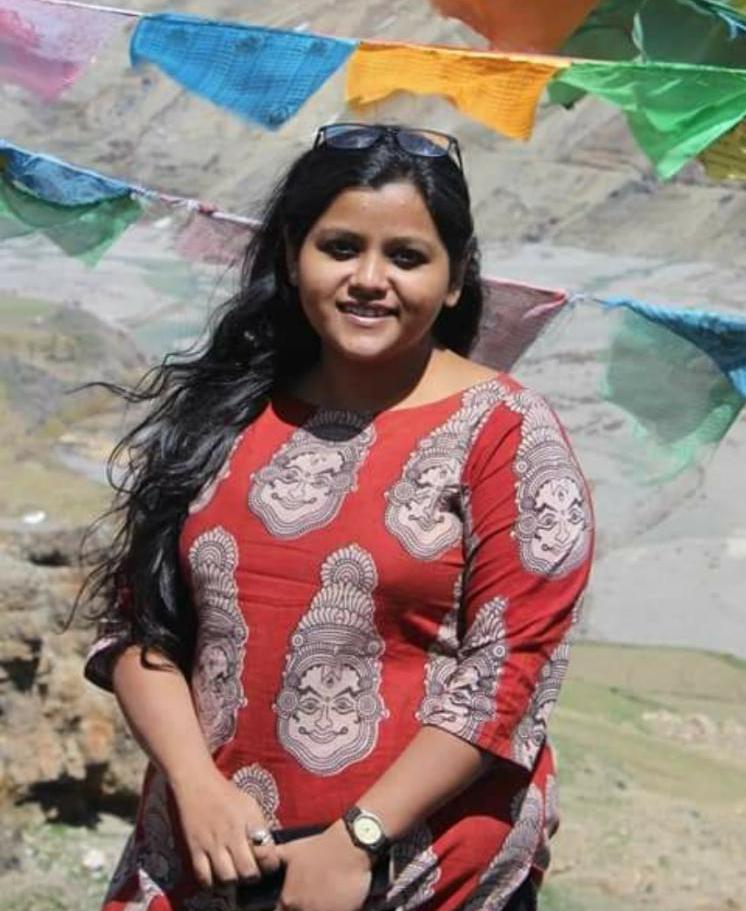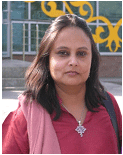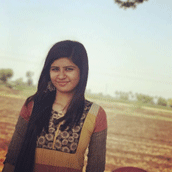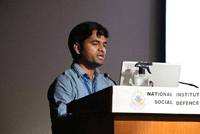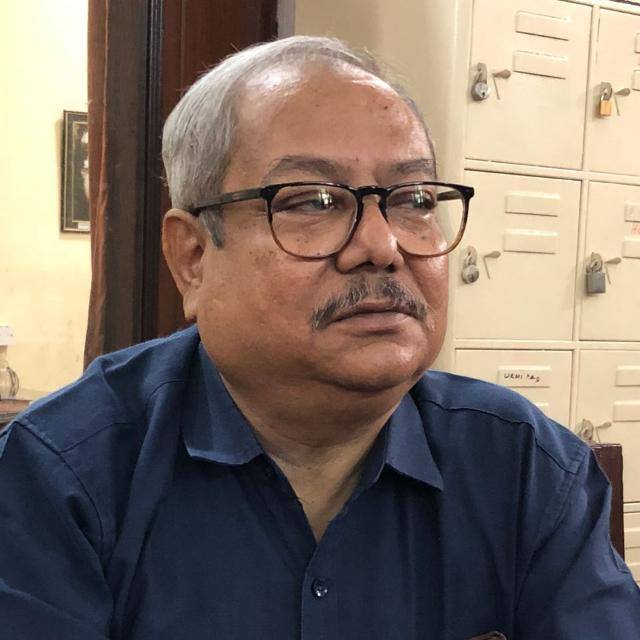Justice, Protection, and Government of the People: A Two-Year Research and Orientation Programme on Protection and Democracy in a Post-COVID World (2021-2023)
Research Segments
In-house Researchers
| Researchers | Topics | Abstracts / Full Paper | |
|
|
Shatabdi Das is Researcher at the Calcutta Research Group (CRG). She was Junior Visiting Fellow at the Institute for Human Sciences (IWM), Vienna, in Austria, in April 2022, under the ‘Europe-Asia Research Platform on Forced Migration’. She is currently doing research on urban and environmental issues and climate crisis. She has previously worked as Junior Research Fellow at the Centre for Urban Economic Studies, University of Calcutta and has also taught Geography at PG level in Sarsuna College, Kolkata (affiliated to the University of Calcutta). Shatabdi has been working with CRG since 2018 on research projects on migration studies, borderlands, displacement, environment and climate change. She was awarded Ph.D. in Geography from the University of Calcutta in 2020. Her Doctoral thesis is on ‘the impact of industrial and urban development on the environment of Asansol-Durgapur Planning Area’. |
Kolkata and Climate Crisis |
|
|
|
Rituparna Datta is a Researcher at Calcutta Research Group, Kolkata. Her research interests focus on migration and mobilities in colonial and postcolonial India. Her ongoing doctoral research from Centre for Informal Sector and Labour studies, Jawaharlal Nehru University looks into the health and wellbeing of coolie labour in the indentured mobilities through a gendered lens. |
“Bhootlane Ki Katha”: Living in the Coolie Lines and Construction of Dignity, Health and Well-Being 1830-1920 |
|
Contracted Researchers
| Researchers | Topics | Abstracts / Full Paper | |
|
|
Anita Sengupta is Director, Asia in Global Affairs. She is an area studies specialist and has been involved with research on the Central Asian region with Uzbekistan being her area of special interest. She has also worked extensively on Turkish politics and on the Syrian refugees in Turkey. She has collaborated with scholars in a number of Universities and Institutes in Tashkent, Bishkek, Almaty, Ankara, Istanbul, Sweden, Berlin, Washington. She has been a visiting scholar in Humbolt University, part of the Swedish International Programme on Central Asia (SIPCAS) and the Nordic Network for Research on Migration, Identity, Communication and Security (MICS). She is the author of Myth and Rhetoric of the Turkish Model: Exploring Developmental Alternatives (Springer 2014) Heartlands of Eurasia: The Geopolitics of Political Space, (Lexington Books July 2009); The Formation of the Uzbek Nation-State: A Study in Transition, (Lexington Books, 2003) and Frontiers into Borders: The Transformation of Identities in Central Asia, (Hope India Publications and Greenwich Millennium Press Ltd, 2002). Her book Heartlands of Eurasia: The Geopolitics of Political Space published in 2009 was selected by the Oxford Bibliographies Online in 2011 as a must read on the section Geopolitics and Geo-strategy. Her book Symbols and the Image of the State in Eurasia has been published by Springer in October 2016. Her most recent publication is Ranabir Samaddar and Anita Sengupta (eds), Global Governance and India’s North-East; Logistics, Infrastructure and Society, Routledge, 2019. She is member of the Editorial Board of the Cambridge Journal of Eurasian Studies, Ideas and Ideals published by the Novosibirsk State University of Economics and Management and Contemporary History of Uzbekistan, published by the Academy of Sciences Uzbekistan. She is also Advisory Board member of Strategic Foresight a journal published by TASAM (Turkish Asian Centre for Strategic Studies) Istanbul and member of Editorial Board of Rising Powers Quarterly, Istanbul, International Research, Society, Politics, Economics, a journal published by the Institute of Socio-Political Research, published from Astana, Kazakhstan. She is a contributor to DNA Edit columns and contributes regularly to public debates as an expert. |
The Pandemic and Governance in Central Asia |
|
|
|
Santi Sarkar is an Assistant Professor at the Department of Political Science, Centre for Distance and Online Education (CDOE), Vidyasagar University, Midnapore, West Bengal, India. His interest area includes Political Theory, Western Political Thought, Indian Politics, Forced Migration, Dalit, and Tribal Studies. |
The Politics of Populist Policies in West Bengal |
|
|
|
Sohini Sengupta is Assistant Professor with the Centre for Community Organisation and Development Practice, School of Social Work - Mumbai Campus, School of Research Methodology, TISS Mumbai. She has a PhD in Anthropology from the School of Oriental and African Studies (SOAS) University of London, Master of Arts in Social Work from TISS, Mumbai and Bachelor of Science with Honours in Chemistry from Miranda House, University of Delhi. She has experience in working with grassroots organization, drought response programmes and public policy making and has worked with Oxfam and as a research fellow with the World Commission on Dams-Social Impacts Team in South Africa. |
Cutures, Histories and Drought in the Context of Climate Change Induced Dislocations and Migration Efforts: A Case Study of the Mahanadi Basin Area in Odisha |
|
|
|
Ankita Singh is a research scholar at NIEPA (National Institute of Education Planning and Administration). She has done M.A from Jawaharlal Nehru University and B.A from the University of Delhi. Her research areas are Alternative Methods of Financing Higher Education, Urban Sustainability and Slums. She worked as a research analyst for 2 years at IEG (Institute of Economic Growth) on the project "Evaluation of Scholarship Scheme in India". Johny K D is a Ph.D. Scholar at IIT Kanpur. He has done M.A from Jawaharlal Nehru University and B.A from St. Stephen's College, DU, Delhi. His research interests are Urban sustainability, City, Slums, Displacement and Rights. In the past, he had worked with prestigious organisations like the Ministry of Social Justice and Empowerment (GoI) and Institute of Economic Growth, Delhi in diverse profiles like Research Analyst, Project Monitoring and Evaluation expert, etc. He also has several publications in National and International Journals. |
Urban Renewal Stage in City’s life and its Impact on Slums and Slum Dwellers – A Case Study of Noida City |
|
Researchers on Pandemic and Precarity
| Researchers | Topics | Abstracts / Full Paper | |
|
|
Harshita Sinha is a PhD Candidate at the London School of Economics working on migrant workers and the Indian informal labour market. She was the India migration fellow 2021 with India Migration Now and Bandhu Urban Tech. Her research interest include migration, citizenship, urban informality, social protection and state welfare in context of developing countries. Her work looks at the intersection of citizenship, social protection and informal labour regimes in urban destination states in India. Harshita holds a MRes and MSc in International Development from the London School of Economics and has a honours in Sociology from Lady Shri Ram College. She recently curated Voices of Informality, a knowledge platform which aims to bring forth grassroots stories on informality for practice-based action. Her research on the gendered study of undocumented immigration in India’s informal economy was awarded with the LSE Life Prize for Research in 2019. She has actively published across media platforms such as India Development Review, Scroll, Wire and India Spend. Her recent co-authored publication include policy reports and briefs with Centre for Policy Research for UNICEF on Child migrants access to India’s social protection infrastructure (2021). |
Negotiating Precarity: Informal migrant workers in New Delhi |
|
|
|
Manish Maskara is currently pursuing a PhD in Development Studies from School of Oriental and African Studies (SOAS), University of London. In his doctoral research, he is examining the question of class formation, taking the case of everyday struggles of Bihari migrant labourers working in building construction sector in India’s cities. As a Graduate Teaching Assistant at SOAS for the last consecutive years, he has been teaching theories of global development and its contemporary issues to UG and PG students. After graduating from Azim Premji University, Bangalore in 2014, he worked on development issues of poverty and livelihoods, gender and migration, water resource management and agriculture. Broadly, his teaching and research interests lie in engaging with questions concerning lives and livelihoods of migrant labourers, their struggles and their relation to development theory and practice. He is deeply interested in using ethnographic approaches and case study methods of doing research. His recent book chapter in an edited volume offers a political reading of experience of migrant labourers in India’s lockdown, beyond the usual framing of migrant labourers as victims or violators of the lockdown. He has published on the exodus of migrant labourers in India’s lockdown and on their struggles in the train journeys between their village and the city within and beyond the lockdown. |
Reproducing precariousness of labour: Post-lockdown ‘reorganisation’ of building construction in India |
|
|
|
Dr. Mahalaya Chatterjee is a Professor of Urban and Regional Economics in Department of Economics, Calcutta University. She was also the Director of Centre for Urban Economic Studies, a research centre specializing on urban studies in the same university till 2017. An alumnus of St. Xavier’s College and Department of Economics, Calcutta University, she has been engaged in research and teaching of economics for the last three decades. She coordinated a course on urban management and planning for the last five years. She has two books (on urban land economics and environmental management respectively) and published an edited volume on socio-economic perspectives of urban development in Howrah, the twin city of Kolkata. Apart from that, she has published numerous articles in national and international journals and edited volumes. She has also participated in seminars, conferences and workshops in India and abroad. She has been acting as reviewer in a number of journals and in the board of editors of few well- known journals like Urban India. She is also is in the advisory board of Globsyn Management Journal. Apart from teaching and research, she is also carrying on different administrative duties like heading the Department (2012-14) and chairing the Undergraduate Board of Studies in Economics in Calcutta University till 2017.She is also an academic member of Mahanirban Calcutta Research Group, Kolkata and Athens Institute of Education and Research, Greece. She is a governing body member of South Asian Institute for Advanced Research and Development (SAIARD). She is associated as a project specialist (urban) in Indian Women Entrepreneurship Programme under the 2ist Century Knowledge Initiative – a collaborative research project of Calcutta University with Claflin University, South Carolina, USA. |
Precarity at the time of Pandemic: The case of slums in Indian cities |
|
|
|
Pratik Mishra has recently completed his PhD in Human Geography from King’s College London. His research looked at the everyday politics of labour within a brick kiln cluster on the outskirts of Delhi. His core research concern is within the field of labour studies, looking at the constitution of labour regimes within worksites in the informal sector. While his research engages with several of the core analytical foci within Indian labour studies literature such as bonded labour, social difference, labour control, ideologies of work, forms of collective action, he juxtaposes these concerns against aspects of the labour regime that have been inadequately researched. These include the interaction of the ecological dimension of production with concrete labouring processes, entrepreneurial local economies anchored to the factory regime, wage relations and material conditions of everyday social reproduction, and the circumstances and affective dimensions of migration between the village, brick kilns, and the city. In doing so, his research draws strong connections between the fields of labour studies, political ecology, and urban studies. His research papers have been published in Urbanisation, South Asian Multidisciplinary Academic Journal, Economic and Political Weekly, among others. |
The pandemic and the lockdown of 2020 as the latest in a series of crises within work and life for migrant workers in the Khanda brick kiln cluster |
|
|
|
Rajat Kanti Sur is associated with CRG since 2020. He did his PhD from University of Calcutta. He has previously worked with TISS (Patna Centre), National Library, Kolkata, Centre for Studies in Social Sciences, Calcutta and Durbar Mahila Samanwaya Committee. He has keen interest in urban studies, popular culture, public health and labour studies. He has published several articles in reputed journals, newspapers and periodicals. He is currently working on the role of cooperative formation as an alternative method to overcome the socio-economic crisis of the marginal and migrant workers. |
Solidarity among the “social outcasts”: Kolkata Sex-workers during the three phases of pandemic |
|
|
|
Samuel Sathyaseelan as a doctoral fellow at Centre for Informal Sector and Labour Studies, JNU, New Delhi, Samuel has undertaken his ethnographic research on the sanitary workers in Bengaluru. His research interests lie in such categories as labour, informality and human rights. Along with these, he has also explored the concepts of caste, sanitation, mobility and the State in his ongoing ethnographic work. The study looks into the nature of work and living condition of sanitary workers engaged in the sewer cleaning and explores the relationship between urban space, sanitation and untouchability which shaped the sanitation management of the city. The work also looks into the everyday functioning of the departments that oversee projects of public health and sanitation needs of the city, helps to identify actors within the narratives of social policy and the vantage point of labour. He worked with the Centre for Child and the Law, NLSIU from 2011 to 2016 as Program and Administrative Assistant. |
Sanitation Workers–Expendable Lives in Times of COVID-19 |
|
|
|
Sangbida Lahiri is a research scholar who submitted her Ph.D. in the department of South and Southeast Asian Studies, University of Calcutta. Presently, she is working as a guest lecturer at South and South East Asian Studies, University of Calcutta. Her present arena of research is on sex-work and child-trafficking in post pandemic Bengal. She is also associated with a research project MCRG which deals with care and public health in precarious pandemic days. She has dealt in her doctoral thesis with youth politics in colonial Bengal within a “history of ideas” framework. In the thesis, Bankim Chandra Chattopadhyay and Rabindranath Tagore – two monumental thinkers from the aforementioned period – are interrogated to understand the formation of political ideas in the late nineteenth and early twentieth century. Violence, politics and love –these are the keywords of her thesis, which is written in vernacular (Bengali). Sangbida recently finished a Carnegie project with the University of Glasgow and Edinburgh. In previous years, she worked in Mahanirban Calcutta Research Group and the School of Women’s Studies, Jadavpur University. She did full-time journalism as a reporter with the two market leaders of Kolkata: one is Anada Bazar Patrika and Ei Samay, Time of India Group. She has published widely in these two newspapers. She is still continuing her journalistic publication. Her notable publications are many in vernacular media. One of her articles on youth politics was published by The Wire and it got immense importance from the viewers. It had been translated and re-published in two other European languages. She recently reviewed Gayatri Chakrabarty Spivak’s first Bangla book APOR which was published in the editorial page of EI Samay, TOI. She volunteers an organization, name Marfat, a non-profit organization based in Murshidabad. |
Life in Dhuliyan: The Tobacco Rollers in Pandemic |
|
|
|
Shatabdi Das is Researcher at the Calcutta Research Group (CRG). She was Junior Visiting Fellow at the Institute for Human Sciences (IWM), Vienna, in Austria, in April 2022, under the ‘Europe-Asia Research Platform on Forced Migration’. She is currently doing research on urban and environmental issues and climate crisis. She has previously worked as Junior Research Fellow at the Centre for Urban Economic Studies, University of Calcutta and has also taught Geography at PG level in Sarsuna College, Kolkata (affiliated to the University of Calcutta). Shatabdi has been working with CRG since 2018 on research projects on migration studies, borderlands, displacement, environment and climate change. She was awarded Ph.D. in Geography from the University of Calcutta in 2020. Her Doctoral thesis is on ‘the impact of industrial and urban development on the environment of Asansol-Durgapur Planning Area’. |
On the Edge of Safety: The Coal Mine Workers in Eastern India |
|
|
|
Shyamalendu Majumdar is an Associate Professor of Political Science in Sivanath Sastri College. He has been a faculty member there since 1985. He is particularly interested in conducting research on forced migration and he had successfully completed his research on the problems and politics of internal displacement of the Reangs in Mizoram. His article on this was published in Refugee Watch Journal. He is deeply involved in carrying on research on the trends of political theatre in Bengal. Simultaneously he is focussing on the socio-political dimensions of the problems of the vagrancy in-flows to the urban areas in post-independent India. He is a member of Calcutta Research Group. |
A Report on Theatre and the Pandemic in Bengal |
|
|
|
Baitali Ganguly is a Master Degree holder in Sociology nad Ford and Perennial Fellow has experience over 25 years in Health and Social Development. She is founder member of Jabala Action Research Organisation and an Ex-member of JJB Kolkata and members of different government committees on child protection Baitali has been successful in launching and implementation programs such as Safe Migration Initiatives; Community Based Rehabilitation of Violence survivors; Football for freedom for girls. She has undertaken several studies like Risk Behaviour of Children of Red Light areas; HIV/AIDS status among migrants and have various publications on child sexual abuse, Human trafficking to her name.. Baitali has participated in many national and international seminars on the issues of migration, trafficking, rehabilitation of survivors. |
Tea Gardens of Dooars & Migration with Uncertainty |
|
Researcher on Caregivers
| Researchers | Topics | Abstracts / Full Paper | |
|
|
Sangbida Lahiri is a research scholar who submitted her Ph.D. in the department of South and Southeast Asian Studies, University of Calcutta. Presently, she is working as a guest lecturer at South and South East Asian Studies, University of Calcutta. Her present arena of research is on sex-work and child-trafficking in post pandemic Bengal. She is also associated with a research project MCRG which deals with care and public health in precarious pandemic days. She has dealt in her doctoral thesis with youth politics in colonial Bengal within a “history of ideas” framework. In the thesis, Bankim Chandra Chattopadhyay and Rabindranath Tagore – two monumental thinkers from the aforementioned period – are interrogated to understand the formation of political ideas in the late nineteenth and early twentieth century. Violence, politics and love –these are the keywords of her thesis, which is written in vernacular (Bengali). Sangbida recently finished a Carnegie project with the University of Glasgow and Edinburgh. In previous years, she worked in Mahanirban Calcutta Research Group and the School of Women’s Studies, Jadavpur University. She did full-time journalism as a reporter with the two market leaders of Kolkata: one is Anada Bazar Patrika and Ei Samay, Time of India Group. She has published widely in these two newspapers. She is still continuing her journalistic publication. Her notable publications are many in vernacular media. One of her articles on youth politics was published by The Wire and it got immense importance from the viewers. It had been translated and re-published in two other European languages. She recently reviewed Gayatri Chakrabarty Spivak’s first Bangla book APOR which was published in the editorial page of EI Samay, TOI. She volunteers an organization, name Marfat, a non-profit organization based in Murshidabad. |
Covid kale Biponnota o Sanhati |
|
Visiting Fellowship
CRG will be hosting four distinguished Visiting Fellows from Nepal, Bangladesh, Indonesia, and Afghanistan, in Kolkata with the support of the Institute for Human Sciences [IWM], Vienna.
CRG Visiting Fellows invited this year are activists, human rights advocates, academicians and scholars from South and South-East Asia, working on bringing up issues relevant to justice, protection, and government of the people. The Visiting Fellowship is from 10-20 November 2022, winding up with CRG’s Seventh Annual Research and Orientation Workshop and Conference on Global Protection of Refugees and Migrants, 14-19 November 2022 in which the Visiting Fellows will be presenting their research. The brief profiles of the CRG Visiting Fellows 2022 are given below:
| Visiting Fellowship | Topics | Concept Note | |
|
|
Amena Mohsin teaches in the Department of International Relations, University of Dhaka. She graduated from the same department and later received her MA and PhD degrees from the University of Hawaii, USA and Cambridge University, UK. Amena has received several national and international fellowships, which include the East-West Center Graduate Fellowship, CIDA International Fellowship, Commonwealth Staff Fellowship, SSRC Fellowship and Freedom Foundation Fellowship. She writes on rights, gender and minority, State, Democracy, Civil-Military relations, borders and human security issues. She is the author of “The Politics of Nationalism: The Case of Chittagong Hill Tracts, Bangladesh” (UPL, 1997), “The Chittagong Hill Tracts, Bangladesh: On The Difficult Road To Peace” (Lynn Rienner Publishers, 2002), “Ethnic Minorities of Bangladesh: Some Reflections the Saontals and Rakhaines” (Programme for Research on Poverty Alleviation, 2002), “Women and Militancy: South Asian Complexities”, edited (with Imtiaz Ahmed), (Dhaka, University Press Limited. 2011), Conflict and Partition, CHT, Bangladesh, (with Delwar Hossain) SAGE, 2015), Of the Nation Born, edited with Hameeda Hossain, Zubaan, Delhi, 2016, Women and Work in South Asia: Rights and Innovations, edited with ASM Ali Ashraf, Niloy Ranjan Biswas and Mohammad Atique Rahman (Dhaka, UPL, 2020). |
The politics of Space: Refugees, Displaced and Stranded
|
|
|
|
Kamal Thapa Kshetri, Head, International Relation Division, Migrant Focal Person, National Human Rights Commission of Nepal) He has been working with the National Human Rights Commission, Nepal as an Head of International Relation Division and Migration. He worked as a focal person of anti-trafficking at office of the Special Rapporteur on Trafficking in Persons within the commission since 2005 and also looks after the human rights issues of Nepalese migrant workers. During the work as a focal person of anti-trafficking, he led the Trafficking in Persons National report preparation and study team member since 2006 to 2018 which was published yearly and bi-yearly. He also engaged on study report of situation of rights of the migrant workers focused on access to justice and recruitment practices of Nepalese migrant workers and research study report of Rights of Nepalese Migrant Workers Amid Covid-19 Pandemic 2020. He regularly engaged to the Government of Nepal, CSOs, and development partners for coordination and collaboration towards the protection of rights of the migrant workers. He was also focal person of implement of MoU with National Human Rights Committee, Qatar and now the focal person of implement the MoU with National Human Rights Commission, Malaysia. He was a member secretary of convene committee of International Conference on Protection of the Rights of Migrant Workers which was held on Kathmandu 2019. Mr. Kshetri liaison with the government agencies, CSOs, International community and development partner on the issues of migrant workers and trafficking. He delivered as a resource person on different issues of migrant workers and also the Technical Working Committee on Migration Profile prepared by Ministry of Labor, Employment and Social Security. Mr. Kshetri has completed LLM on Human Rights and Gender Justice from Kathmandu School of Law (2010). He also completed Refugee and Forced Migration summer course from Oxford University, Refugee Study Center (2011). |
Protection of Nepalese Workers in India and Nepal |
|
Events / Public Lectures / Webinars
Disseminations / Resources / Important Links

]

